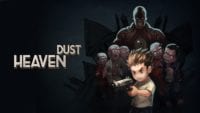Justin Beahm is a man of many talents within the horror film industry and community. He first worked on the website for A-Pix Entertainment, also eventually working for Trancas International Pictures. He’s written for various horror publications such as Fangoria, Horrorhound, Scream, etc. He appears in movies from time to time. His most interesting acting credit to me was as an extra in Sharknado(2013). He has moderated several commentary tracks and appears at various horror conventions across the country. He’s the host of his own podcast, The Justin Beahm Radio Hour Podcast. His company Reverend Entertainment has also produced many Blu-ray releases for Shout! Factory, Scream Factory, Anchor Bay, Vinegar Syndrome, etc.
I first met Justin Beahm at a horror convention called Horrorhound Weekend in Cincinnati, Ohio in 2013. He was there promoting a documentary short he’d directed about the Halloween franchise called You Can’t Kill the Bogeyman (2012). Our interaction was brief, so there’s no reason for him to remember me from that. However, we did eventually connect on social media, and I have also seen him twice since then.
The next time was at the B-Movie Celebration in Nashville, Indiana in 2014, which he was a part of. I also for the first time got to meet legendary horror host Joe Bob Briggs there. It was many years after Briggs hosted Monstervision. This was also a few years before he would return on Shudder’s The Last Drive-In. I have Justin to thank for finding out about that fun event. The most recent time I saw Justin was at another Horrorhound Weekend, this time in Indianapolis, Indiana, just last year. Most of our interaction though has been online.
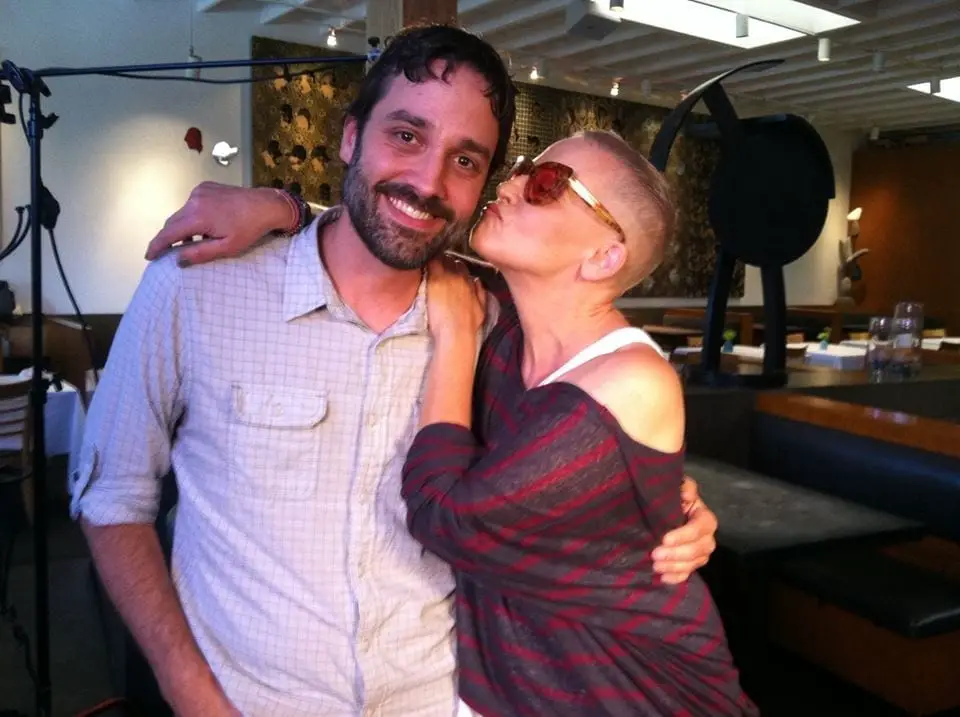
Aaron: Hello Justin, I just want to thank you for your time. Now, while we’re mostly here to discuss horror, I want to start outside of that. What were some of your influences in other film genres, or favorite non-horror films?
Justin Beahm: Thank you for reaching out on this. I am honored to be part of it.
I am a fan of movies that are fun, regardless of genre. As a kid, I was a blank slate when it came to what I would rent. It was a pretty magical time to stroll the aisles at the video store and roll the dice on a title often based solely on the cover art. This led me to so many discoveries in every genre. Movies I can quote from front to back include Billy Madison (1995), Revenge of the Nerds (1984) and Revenge of the Nerds II: Nerds in Paradise (1987), Meatballs Part II (1984), and I’m Gonna Git You Sucka (1988). I absolutely adore Blade Runner (1982) and Blade Runner 2049 (2017), The Running Man (1987), Stand By Me (1986), and so many more. It is really endless.
Movies just blew me away. I was amazed they existed and marveled at what was on screen no matter what it was. I don’t remember ever disliking anything I watched as I was growing up. It was all incredible to me. This sense of awe is even stronger now that I know the complex machinery necessary to pull one off. In my opinion, it is truly the most wonderful form of contemporary art.
Aaron: That’s a good list of movies. There wasn’t a single one you mentioned that I disliked, though I haven’t yet seen I’m Gonna Git You Sucka. So, even outside of film, what were other things that influenced you, or that you were passionate about? What are some things you grew up doing?
Justin Beahm: From a pretty early age I was into music. I marched a couple of years with a drum and bugle corps, then moved on to be part of a number of bands from junior high through high school and beyond. I sang (a term I use loosely in this case) for one, and played drums for all the rest. Although I don’t play at the moment, the lessons learned during those years continue to inform what I do. I was always the one marketing and booking whatever group it was. Printing business cards, reaching out to event coordinators, and all of that.
The other constant in my life has been writing, which started as early as I can remember. I was fortunate enough to have some great teachers who supported my scribbling and helped me feel confident to continue doing it. That led to me writing and selling poetry books, short stories, and creating chapbooks once in a while to hand out when my band would play. It wasn’t so much marketing or wanting to make money as it was wanting to share my stories and getting enough money to do the next print run at the local copy shop. Writing would go on to open every single door in my career, and it all began back in 4th grade. So grateful to have had those teachers encouraging me.
Aaron: That’s awesome. So let’s get to horror. Where did it all start for you? Was it one film in particular that served as your gateway? Or are there several which led you down the road of becoming a horror geek?
Justin Beahm: There were several things that led me down this path. The first was my local library, which stocked all the Crestwood House Monster Series books. You remember them? With the orange spines and backs?
Aaron: I can’t say I do, but feel free to elaborate.
Justin Beahm: Each one was about a different movie monster and told the stories behind their various adventures at Universal, Hammer, and wherever else. They also had a line of books about mythological creatures like Bigfoot and the Loch Ness Monster. I poured over all of these, checking them out over and over again, which got me familiar with the creatures before I had even seen the movies.
From there I started renting tapes, first beginning with the Universal monsters, which was so exciting. Again, it was my library that had the classics. The local rental places didn’t stock that stuff. My buddy Matt had cool parents who let him subscribe to Fangoria magazine, and once he showed me an issue of that, it was like a supernova in my head and heart. I was captivated and that piqued my interest in more contemporary horror. The effects and stories from behind the scenes were so exciting. He would sneak them into school for me to check out while we were in reading group or whatever other time I could hide the magazine behind a school book.
Fangoria had me reading about all the movies being made at the time, but I couldn’t rent most of them. The most memorable imprint happened on Halloween night in the 5th grade, again with my friend Matt. I was trick-or-treating with him in his neighborhood, which was much bigger than mine so it would result in a heftier haul. I was dressed as Sid Vicious, complete with spiked up hair and a chain necklace. Anyway, we rushed through the neighborhood to get back to his place in time for a movie he wanted me to watch, which was Halloween II (1981). We made it back in time and for the next hour. Until my dad came and got me, I sat in front of the television in Matt’s basement frozen in fear.
Another friend, Al, had a brother with an extensive book and comic collection, and in it one day I came across the novelization of Halloween (1979). I borrowed it along with the cassette of the score, something his brother also collected, and took them home. I would turn the tape on and read the book a chapter at a time, getting to the point of being freaked out, then putting it down for a few days. So similarly to the monster books preceding the monster movies, I read Halloween and knew the score before seeing the movie. And it still managed to scare the hell out of me. That is how it all began.

Aaron: Well, that’s certainly an interesting introduction to the genre. My first horror film was Child’s Play (1988) when I was six. My dad taped it off TV and let me watch it. What is your all-time favorite horror movie, and some of your other favorites? What is your favorite sub-genre? For me, I consider slashers my “horror comfort food.” They may generally be the least creative or original. However, I think it’s the familiarity itself that brings me back, that I can depend on to entertain me. Are there sub-genres or series of horror movies that are like that for you?
Justin Beahm: Picking a single favorite is impossible for me. Like pointing to a favorite child. Some favorites include Begotten (1989), Halloween (1978), Night of the Living Dead (1968), Ghost Story (1981), The Blob (both 1958 original and 1988 remake), Carpenter’s The Thing (1982).
I am a slasher fan, too, and while they are still that comfort food you mention, I have found myself less interested in that sub-genre as I grow older. I have developed a great affection for more cerebral and artistically adventurous films like what A24 is doing. The films of Panos Cosmatos. A Girl Walks Home Alone At Night (2014). Things on the fringes.
Aaron: Some great titles in there. Halloween is my own favorite horror movie of all time. I too love what A24 is doing. They have great quality control. So what were some of your first, early creative endeavors? I’m not even necessarily talking about professionally. Just what are some things you did pursue creatively, even as a child or adolescent?
Justin Beahm: My friends and I used to rent VHS camcorders and make movies for fun. Gorillas in space and things like that. Like I mentioned earlier writing and music have been a big part of my world since I was little. I wrote a play once that my junior high put on. It was based on The Phantom of the Opera and was creatively titled Phantom of the Junior High. Silly stuff.
My brother and I had a boom box tape recorder and I remember us making radio broadcasts on there. We would noodle around on our little keyboard and create characters. That grew into me putting on Saturday Night Live skits for my family where I would act out the different regulars on the show along with some I created on my own. I am pretty sure my mom and dad were less amused and more annoyed by me and the things I was doing. Still the case.
Aaron: It seems like there isn’t one single way to get into a professional career in film. Often, it’s more about luck and/or coincidence. Is that how it was with you? How did you first break into it? What was your first professional gig?
Justin Beahm: You are absolutely right about there being no direct path or ladder to climb to get into the industry. It is both a blessing and a curse. My story is just as weird and meandering as most everyone else’s. When the internet was in its infancy, I wrote to a distribution company I loved called A-Pix and asked if I could run their website. Against what should have been better judgment on their part, they were on board and sent me all sorts of stuff from behind the scenes of movies like Jack Frost (1997), Uncle Sam (1996), The Surgeon (1995), and their other titles to use on the site. I ran that for a year or so and that taught me I could be bold and just take the shot when I found something I wanted to try.
From there I got into the newspaper business, serving as Assistant Editor of a few weekly rags in Illinois. I wrote here and there for a regional music magazine and some other outlets. Eventually, I got the nerve to write to Chris Alexander as he was just about to step in as editor of Fangoria, sending him a massive Night of the Demons franchise retrospective I had spent months on. He liked it and brought me in, and that is when everything in my life changed.
At the same time, I appeared in a film called Collapse (2011) shooting here in Iowa. I was a zombie, which was fun. I met the filmmakers Mike Saunders and Jason Bolinger and became fast friends with them. Started attending Iowa film meetings and lending a hand on any kind of production I could find across the state. I ended up doing a variety of things to get my feet wet: serving as a grip, learning lighting, running cable and some camera work for NBC during Olympic wrestling tryouts, political commercials, a pilot for MTV. The list goes on and on. Those were the trenches where I learned a lot, from properly wrapping a cable to scouting best locations for lights and beyond. An invaluable education. Iowa is a great place to create.
All of a sudden I was working the Fangoria booth at San Diego Comic-Con, appearing at conventions, hosting events, and meeting a lot of really amazing people inside the business. I met Malek Akkad when interviewing him for an article and we hit it off. That led to us co-founding a non-profit together and me getting on board at Trancas International Films. All of that led to me producing the Halloween 4: The Return of Michael Myers (1988) and Halloween 5: The Revenge of Michael Myers (1989) Blu-Rays, including my first commentary appearances. After Trancas, I started producing for Shout and Scream Factory and some others, which has become my main gig.
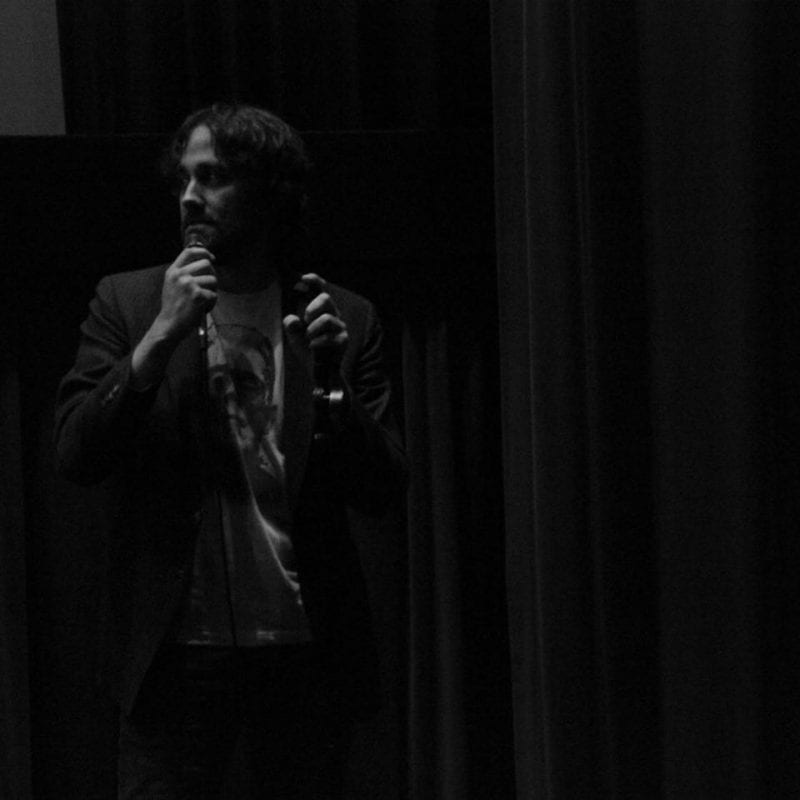
Aaron: Is there any advice you have for people that are trying to pursue film as a career?
Justin Beahm: The best advice I can give is to do the work. Walk into any pitch session, lunch, or introductory email armed with quality work you are ready to present. Be kind, respectful, up-front, and patient. Allow yourself the freedom to measure your own success and not base your feelings about the work you are doing on the opinion of others. Be brave. Above that, no matter what level of success you attain, never stop helping the people around you and elevating the others doing what you do. It is a family, and it is about love of both the art and the people creating it. Oh, and don’t give it away. You are worth it. Your work is worth it. Get paid.
Aaron: Hmm, I might have to mention some of this to my boss (laughs). Anyway, take us through some of your professional history. Does it feel more segmented, that it went from one position to another, one at a time? Or did it all feel mixed?
Justin Beahm: For me, there have been periods of explosive productivity and growth, and times where I had nothing going on for long periods of time. In 2014 I took a hiatus after being burned out from doing too much for too long a time. I have a hard time saying no and an even harder time turning it off, so I am always burning the candle at both ends. But I suppose that is how I stay afloat.
Another piece of advice I would give someone is to diversify yourself as much as you can. I keep all my channels flowing all the time. Film, writing, and podcasting. Beyond that, I do a lot of event hosting and help people on various projects here and there. I am open to just about anything and am always eager to help people.
Aaron: I can certainly identify with burning myself out and needing a break at times. Is there one professional role you like more than the others you’ve participated in? What are some positives and negatives of each? Any truly awful jobs that you just had to suffer through to get to the next thing?
Justin Beahm: The common thread with my main two gigs, producing and feature writing, is helping people tell their stories. As much as I love writing, creating my documentaries is satisfying on so many levels and is my favorite. From research and planning to shooting and editing, it is an all-in experience that is really second to none. But at the heart of all of it is the honor of shining light on the people who create the things we love and sharing their tales. Preserving history, you know?
There have been some negative experiences, but I walked away from them with lessons learned and a frame of reference for the future. If you can’t take loss and failure in stride it will be hard to survive in a business like this. I can’t imagine how it is for actors. I always ask them about that in my interviews. About how it feels to have to sell themselves and hear no 90% of the time. It has to be so hard. I admire their resolve.
Aaron: I know at one point you were developing a book on the history of the Halloween series. What happened with that? Why did it fall through?
Justin Beahm: Yes, I spent a lot of time getting that book going. I have some great interviews in hand and had a great contract ready to be signed with my dream publisher, but the rug was pulled out from under it when things went south with Trancas. In the end, the necessary parties related to the license wouldn’t sign off on it and it died a sudden death.
It is something I hope happens one day, and I hope it will be in good hands. The franchise deserves an exhaustive, loving book like Peter Bracke’s Crystal Lake Memories: The Complete History of Friday the 13th (2005). I have attempted twice to resurrect it, but it isn’t in the cards as long as I am involved. It was going to be an official book, which is important to me. I don’t have any interest in doing anything unofficial but will definitely do something with the interviews at some point.
One of them just ran over two issues of Scream magazine out of the UK. It was my conversation with Rob Zombie on his Halloween II (2009). It was weird having had our first conversation about the film back in like 2012 and then to chat about it again this year for some follow up info to include. Turned out to be a great piece, and we even got the cover. Neither of us could believe it.
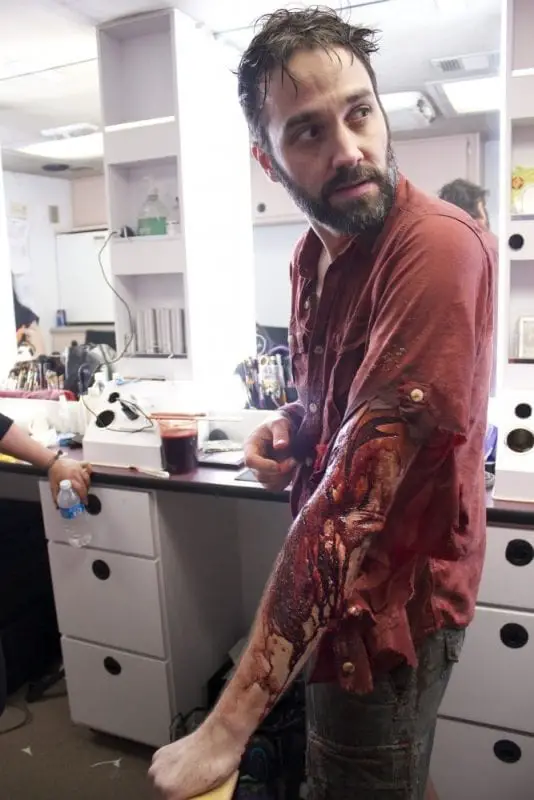
Aaron: I’ll need to check that article out. I do think Zombie’s Halloween II is better than it gets credit for. There are certain things about it where I’m curious about what his intentions were. Tell me about Reverend Entertainment. How did that get started? What role do you play there, and what does the staff look like?
Justin Beahm: Reverend Entertainment is another weird story that has roots back when I was writing for the newspapers I mentioned earlier. At the time I found out there was a local pro wrestling group in the Bloomington, Illinois area, and I went to do coverage of one of their events. They asked me if I wanted to take part in a show, an offer I couldn’t pass up. I created this character called The Dead Reverend and had this ridiculous, overly elaborate backstory to him. An avenging Reverend who was a victim of the Salem witch madness. I wrestled three events for them that were a blast. Got to put a guy through a table, use chairs, etc. Retired undefeated!
The character stuck with me and I reached out to an artist in the area about developing a comic book based on the Dead Reverend. He did some preliminary sketches and I started writing, but it was not meant to be. He all of a sudden disappeared, and I got busy with other things. Sorry for the long story here, but the name always stuck with me, and when I started producing movies I decided to call my company Reverend Entertainment.
Several Octobers ago I formally created the company as an LLC and am now putting all the work I do under the Reverend banner. I am terrible about promoting it and myself, so I have a lot of work to do, but I am off to a decent start.
As far as staff goes, it is really just me. I’ve got crews all over the place that I hire for shoots, most of which I like to be present for so I can ask the questions I have written. I work with a network of people for the various elements like editing and location featurettes, although I am now editing a lot myself. I consider everyone I work with as being in the Reverend Entertainment family, and I am honored to have such a talented roster of incredibly creative and dedicated people around the world contributing to all of this. The day-to-day is all me, though. Researching, outreach, scheduling, booking locations, writing the interviews, transportation, delivery of elements, and anything else that needs to be done. Even if it is a candle at both ends situation, I really love it and am grateful to be doing it.
Aaron: What are some of your favorite and least favorite specific projects you’ve worked on? What would be your dream project? Like if you could pick any film to cover, what would it be?
Justin Beahm: One favorite would be The Blob (1988). What a dream come true. That film had been neglected for so long and it is an absolute honor to have produced the ultimate Blu-ray on it. Also Big Trouble In Little China (1986). Another one I have spent my life with and am pinching myself about being part of.
In terms of least favorite, I don’t know what to say other than there have been some films assigned to me that were not necessarily part of my collection beforehand. Screamers (1995) is one. Not a “least favorite” as much as it was something completely new to me that I learned to love through working on it. All are an honor.
Aaron: I’m eager to check those releases out. I just recently bought that Blu-Ray of The Blob as it was on sale. That’s one I’ve actually never seen! I haven’t seen the original either. So, if horror hadn’t worked out for you, what do you think you’d be doing? Did you strongly consider or dabble in any other careers? Do you have other jobs that aren’t related to film, maybe that you had to do in order to pay the bills?
Justin Beahm: I actually went to school for secondary education, to be an elementary school teacher, but found that wasn’t the fit I had hoped for. The newspaper thing was fun, but not something I would want to be rolling the dice on now with the decline in paper sales.
As far as paying the bills, over the years I have worked for an insurance company, an auto finance company, and for many years in music instrument retail. I really liked the magic of handing a kid a pair of drumsticks and getting them behind a kit for the first time. Seeing that moment of realization wash over them that they can create music without having to have any kind of formal training. It was just them and this new form of expression. I treasured that and have remained in touch with some of the families that used to shop with me.
Long answer long, I have no idea what I would be doing. Probably something with kids and music.
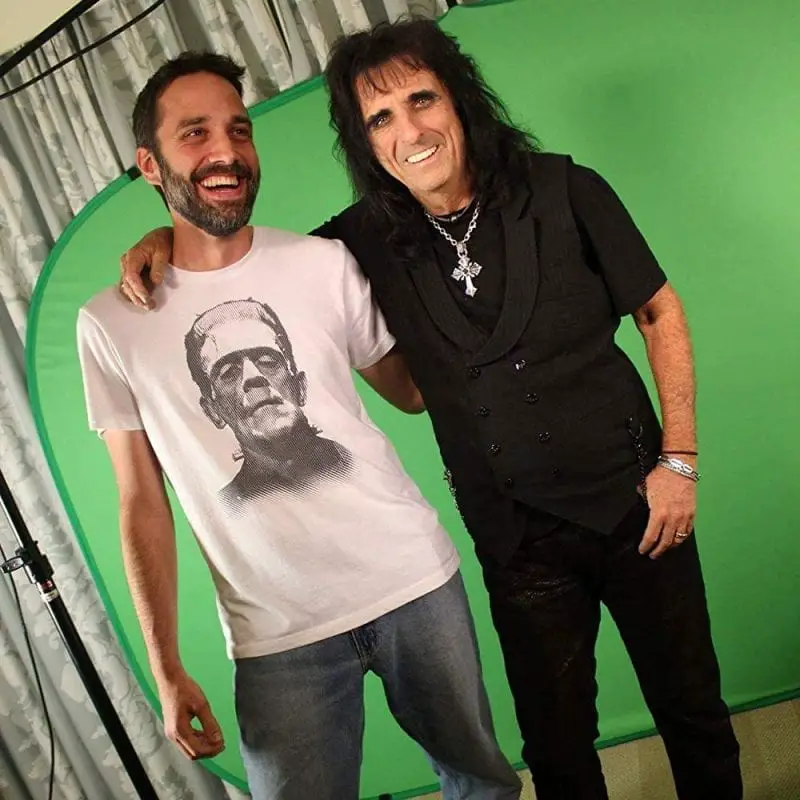
Aaron: That’s interesting. Now, I want to ask about one horror movie project that Reverend Entertainment worked on in particular. I was so jealous that you got to cover Silent Night, Deadly Night Part 2 (1987). Now, I really enjoy the first movie in the series, as well. Yet, I consider Part 2 to be my favorite “bad movie” ever. Like, my favorite movie to riff on, or give the Mystery Science Theater 3000 treatment. For some people, it would be The Room (2003), or Troll 2 (1990), or so on. But for me it’s Silent Night, Deadly Night Part 2. How was that experience for you, and are there any special tidbits you’d be able to share?
Justin Beahm: Silent Night, Deadly Night Part 2 was a real adventure. I have long adored the movie too, so it was exciting when I got the call on it. I had done the disc for the first Silent Night, Deadly Night (1984) a year or so prior and it was nice to get the nod on the second.
The thing about that one is, just as you mention, many people think of it as this bad movie, and poke fun at “Garbage day!” and all of that, but what I quickly uncovered was a tapestry of people that put a lot of time and care into making it. Much more than it gets credit for. The film is incredibly ambitious for the limited schedule and budget they had. Once I met director Lee Harry and star Eric Freeman I knew I had something really special on my hands, and an opportunity to offer people a real look at how the thing came together and all that everyone put into it.
Lee has had a wonderful career cutting trailers for studios anonymously, but I know he would love to direct more. He comes right out and says he thinks Silent Night, Deadly Night Part 2 harmed his career, and Eric says the same, which is heartbreaking. My mission with the documentary was to sort of vindicate them. To help shed light on Lee’s life-long passion for film-making especially. In the interview he talked about how he was making films as a kid with his friends and even some stop motion shorts. As I was editing the doc I texted him asking if he could find any of those old reels for me to include clips of, and sure enough a few hours later he had tracked them down and converted them to digital for me. So my film starts off with his earliest film work.
As far as effort and all that, you also see that Lee meticulously story-boarded the movie using both drawn and photograph boards. I do some fades from storyboard to scenes in the movie, and you can see how clear his vision was. In just a handful of days they pulled off dozens of locations, a huge, and terrifying, car stunt and explosion, a scene using a rain machine, all those special effect set pieces like Chip’s head exploding and so much more.
Aaron: Would you care to elaborate on what your interactions with the movie’s star Eric Freeman were like? He’s the most enjoyable aspect of that movie, and it’s because of his constantly over-the-top performance. Like, I think there’s only one brief moment where he isn’t playing it over-the-top. I don’t put that on him either. Someone directed him to play it that way.
I got the chance to meet him at a convention myself. I was a little disappointed he couldn’t do a video for me saying his trademark line, for legal reasons. It was difficult articulating my feelings about the film and his performance without being insulting. You could arguably call the movie and/or his performance “bad” so to speak. I wanted him to understand though that as long as something entertains you, that other stuff doesn’t really matter. I also didn’t want to discredit or belittle his or anyone else’s degree of work on the film either. Yet I found that he was pretty understanding and happy to talk. Is that how it was for you? And how do you feel about this topic of movies that are entertaining in the sense that they’re “bad”?
Justin Beahm: Eric is great and was so real and open in the interview for the documentary. The story of his being oblivious to the film’s popularity and then discovering the cult of Freeman is great stuff. There is this moment at the end of the interview where I asked him what his relationship is with the film now, and he seemed to really turn inward as he answered it, then locked into this kind of contemplative gaze. Then I call cut and he continues staring off at the floor, ruminating on all this film has meant to him. It was such a special moment. I left all of it in there through to when we cut the camera and some people think it was a mistake in editing, but it was absolutely intentional.
His story is really unique, and that is why I included my buddy Scott Pearlman’s teaser for a documentary he is in the works on called Finding Freeman. I am excited for Eric’s full tale to be told and it was a thrill to bring him out of the shadows for the first time on our Blu-ray. We became close friends.
Scott and I have discussed this thing that is pretty unique with Eric. Despite having been in a number of films and television shows over the years, the audience at large just knows him as Ricky. People have spent decades with this character and that one performance, so I can understand how it might be hard for some people to separate him from Ricky. He is a very kind and self-deprecating person. I hope that came across in the interview.
Regarding movies that are considered good for how bad they are: hell, I swim in that stuff. I watch more movies that the general audience would think are bad than movies that have won awards and all that. There is artistry in everything, and the variety of ways I attach myself to movies is endless. I love having fun and being entertained, and more often than not, I find movies off the beaten path or that others might consider weird to hit the mark. I am bored with a lot of the mega action superhero movies, for example. Not that there is anything wrong with them, but I get a lot more out of discovering something Vinegar Syndrome or Mondo Macabro distributes.
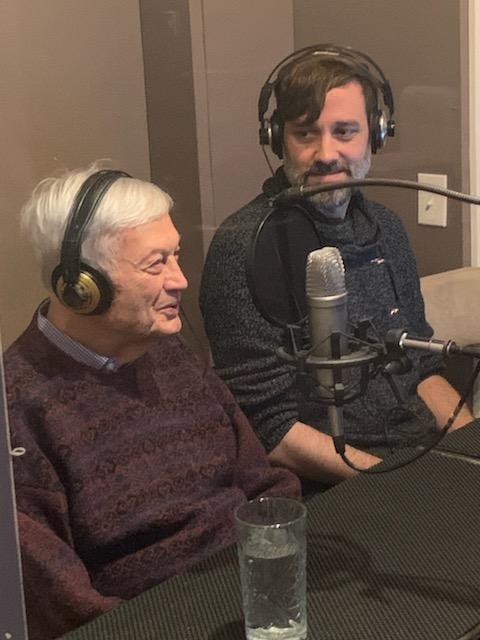
Aaron: That’s cool. I have purchased the Silent Night, Deadly Night Part 2 Blu-ray. I have to admit though that I haven’t yet had the chance to really dig into the special features. I’m very much looking forward to it when I get the chance. Switching gears a bit, how have your interactions been with horror fans? What do you view your role as within that community? I’ve met you a few times, and communicated with you on social media for some years now. I find you very easy-going and accessible, more-so than other people I’ve interacted with within the horror community. Do you see yourself this way? Where do you think that comes from, and is this important?
Justin Beahm: Thank you, man. Same with you. I have really enjoyed getting to know you over time and always enjoy when we have time to hang out at an event or chat online. Everyone I have ever met online, at a convention, film festival, screening, workshop, or signing event has been wonderful. Not blowing smoke here, but the horror community is populated with kind, open, generous, enthusiastic, passionate people, so the conversations are always interesting and most everyone is great. When you are standing with someone who shares your interest on the level most horror fans have, it offers endless discussion. And there is a built-in respect for this stuff and each other that I am always happy to share with people who are new to this realm or want to understand what it is all about.
As far as my role in it all, I really don’t know. I guess I am kind of a caretaker, if anything. I like connecting people and helping others get to where they want to be. Find their way, their voice. Share their stories, preserving as much as I can while walking gently so I don’t fuck too many things up. And always a fan first.
Aaron: Are there any future projects you’re able to discuss?
Justin Beahm: Pet Sematary Two is coming out soon, as is Munster Go Home!, April Fool’s Day, and The Deer Hunter. There are other titles I am working on that have yet to be announced.
The Radio Hour podcast continues to move along. I have been really happy with the guests that have been so generous with their time. Continuing to write for Scream magazine. Really excited to grow my production company into new territory with projects that are all my own.
Aaron: I really look forward to checking that stuff out. Alright, I think that’ll do ‘er. Thank you so much again for your time. This has been great.
You can find out more about Justin Beahm’s work at JustinBeahm.com.
All images © 2020 Justin Beahm. All Rights Reserved

